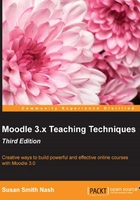
Keeping discussions on track
One of the biggest challenges in using forums for an online class is keeping discussions focused on the topic. This becomes even more difficult when you allow students to create new topics in a forum. It is important to relate each topic to the learning objectives. It can be useful to refer back to the specific learning objective and even map it to the assessments. Moodle offers two tools that you can use to help keep discussions on track: custom scales and splitting discussions.
Using a custom scale to rate relevance
Moodle enables you to use a scale to rate student's work. A scale offers you something other than a grade to give the student as feedback. Scales can be used to rate forum postings, assignment submissions, and glossary entries.
To create and apply a custom scale, follow these steps:
- Users with the roles Administrator, Course creator, and Teacher can create custom scales.
- From the Administration block, click on Scales. This displays the Scales page.
- On the Scales page, click on the Add a new scale button. This displays the Editing scale page.
- On the Editing scale page:
- Enter a Name for the scale. When you apply the scale to the forum, you will select the scale by this name.
- In the Scale box, enter the items on your scale. Separate each item with a comma.
- Write a Description for your scale. Students can see the description, so use this space to explain how they should interpret the scale.
- Select the Save changes button. You are now ready to apply the scale.
- Create or edit the forum to which you want to apply the scale. The key setting on the Editing Forum page is Allow posts to be rated?
- When you review the student postings in the forum, you can rate each posting using the scale you created, as shown in the following screenshot:

- When you finish rating the postings, click on the Send in my ratings button at the bottom of the page to save your ratings.
Splitting discussions
Users with the roles Administrator, Course creator, or Teacher can split a discussion. When you split a discussion at a post, the selected post and the ones below become a new topic.

In this example, the teacher was lucky. Under the pro-coup posting, there were no pro-uprising replies. If there were, those replies would have come with the pro-coup posting and the teacher would not have been able to make a topic that was completely pro-coup.
As the split function takes all of the replies nested under the split point, when a discussion has gone off course and come back on course, you should consider whether you really want to split the discussion.
Consider the following example. In Reply 1-2, the conversation went off topic. For the next two replies, it remained off topic. But then, Reply 1-2-3 brought the conversation back on topic. Should you split the conversation at Reply 1-2? If you do, you'll move Reply 1-2-3, which is on topic, out of Topic 1. When it's taken out of Topic 1, will Reply 1-2-3 still make sense?

Before splitting a forum thread, consider these two issues:
- How will rearranging the topics change the meaning of the forum?
- Will splitting move any replies that you want to keep in place?